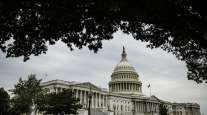Senior Reporter
US House to Consider FY24 Transportation Bill

[Stay on top of transportation news: Get TTNews in your inbox.]
Legislation to ensure the Department of Transportation is funded through fiscal 2024 is scheduled for consideration this month in the U.S. House of Representatives.
Following Congress’ last-minute approval of a funding bill to avert a partial shutdown on Oct. 1, the Republican-led chamber is expected to debate the transportation legislation as early as the week of Oct. 9.
The committee-approved appropriations bill, which would dedicate nearly $1 billion for the Federal Motor Carrier Safety Administration, also would fund highway safety operations, grants for infrastructure projects and supply chain connectivity programs. Republican leaders have called on colleagues to approve the legislation.
“The bill prioritizes safety programs at [Department of Transportation] to ensure that our roads and railways are safe for freight haulers and the traveling public,” Rep. Tom Cole (R-Okla.), chairman of the transportation funding subcommittee and the bill’s sponsor, said earlier this year.
“The bill supports DOT’s maritime mission with full funding for security programs — which are part of the defense function — along with support for academies that train the next generation of mariners,” Cole continued.
The House Appropriations Committee on July 18 approved the $90.2 billion fiscal 2024 transportation measure, which also includes funding for the Department of Housing and Urban Development. The bill would provide $62 billion for the Federal Highway Administration, $19.5 billion for the Federal Aviation Administration, $14.6 billion for the Federal Transit Administration, $1.4 billion for the Federal Railroad Administration and $1.2 billion for the National Highway Traffic Safety Administration. Specific to trucking policy, the legislation would prohibit requirements linked to inward-facing cameras on commercial motor vehicles.
On the other side of Capitol Hill, senators on the appropriations committee approved over the summer their fiscal 2024 version of the transportation bill. The Senate’s $98.9 billion for the departments of Transportation and Housing and Urban Development would dedicate $16.8 billion for FTA. It also would provide $3.4 billion for FRA, and $20.2 billion for FAA.
Similar to the House version, the Senate bill would provide FMCSA with nearly $1 billion for the upcoming fiscal year.
On Sept. 30, the House and Senate cleared a bipartisan short-term funding fix to avert a federal shutdown. President Joe Biden enacted the measure, which guarantees funding for federal agencies through Nov. 17. “I strongly urge my Republican friends in Congress not to wait,” the president said Oct. 1. “Don’t waste time as you did all summer. Pass a yearlong budget agreement.”
Senate Appropriations Committee Chairwoman Patty Murray (D-Wash.) also called on colleagues to wrap up the legislative funding process ahead of the mid-November deadline. “The only way to avoid a shutdown — the only way to get things done — especially in a divided Congress is to sit down with the other side, and do the hard work of negotiating, talking to one another,” Murray said Sept. 30.
The chairwoman went on: “It is not to cave to the most extreme members of your caucus and go back on your word. I think most of us have known that from the start.”
Want more news? Listen to today's daily briefing above or go here for more info
Sen. Susan Collins (R-Maine), the funding panel’s ranking member, pointed to a need for bipartisan legislative action over the coming weeks.
“Government shutdowns actually cost taxpayers money by increasing the cost of short-term borrowing by the government and have an adverse impact on the entire economy,” Collins observed. “Now that this immediate crisis has been averted, it is time to get back to processing the 12 appropriations bills that passed the Senate Appropriations Committee with overwhelming bipartisan support.”




